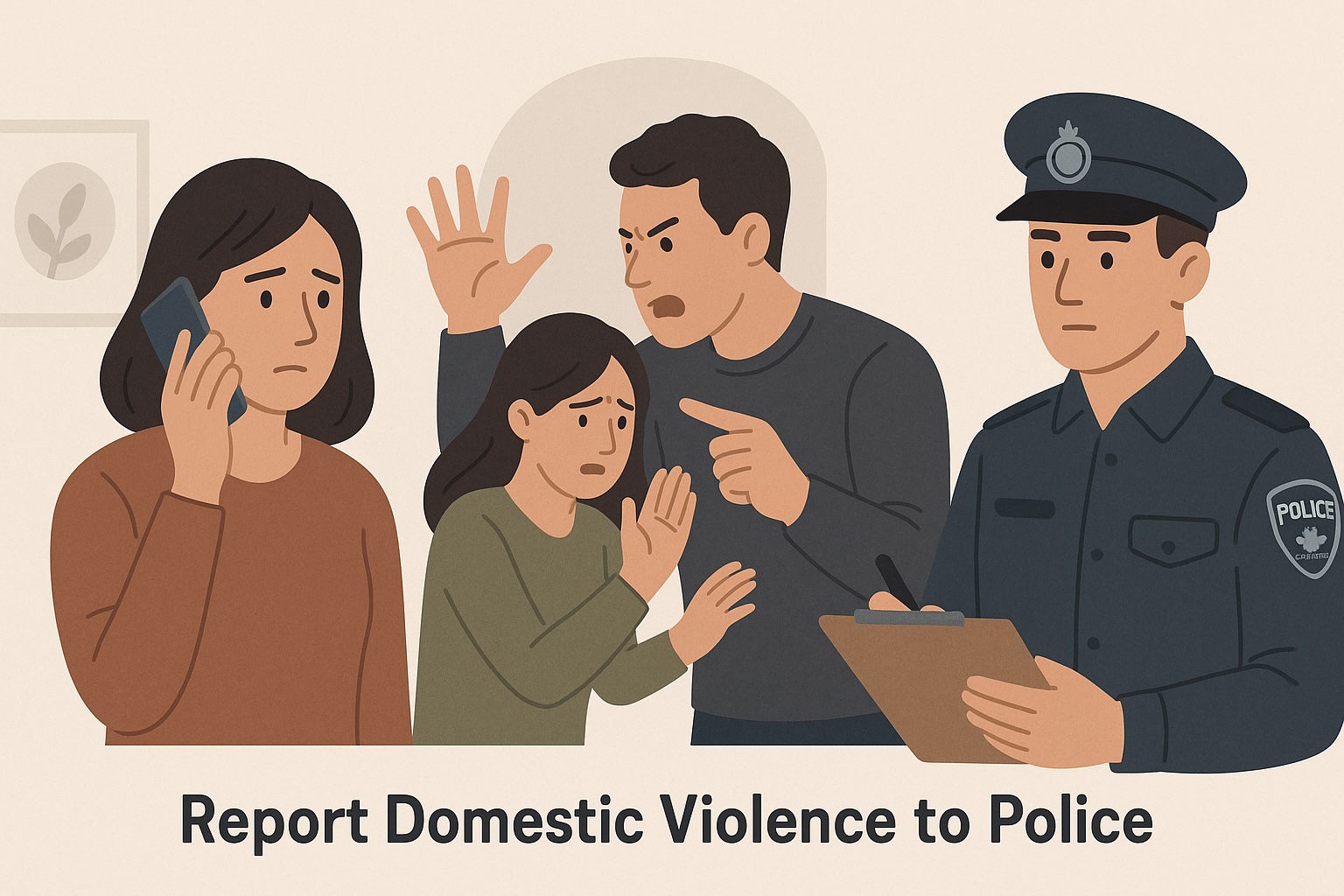How to Report Domestic Violence to Police in Ontario
If you or someone you know is experiencing domestic violence in Ontario, you can report it to the police confidentially. Learn how to make a report, what happens next, and your rights as a survivor.

🚨 How to Report Domestic Violence to Police in Ontario
Domestic violence is a crime in Ontario, and the police take it seriously. If you or someone you know is in danger from a spouse, partner, family member, or caregiver, you have the legal right to report it and seek protection.
This guide explains how to contact police, what happens after a report, and what protections are available in Ontario.
📞 In Immediate Danger? Call 911
If you are in urgent danger, call 911 immediately. Police officers will:
Respond to the scene
Remove the aggressor if necessary
Take statements
Connect you to victim support services
You do not need proof of abuse to make the call. Police are trained to assess the situation and ensure your safety.
🧾 How to Report Non-Emergency Domestic Violence
If it's not an emergency, you can still report domestic violence in several ways:
1. Call Your Local Police Service
Find the non-emergency number for your city or town. For example:
Toronto Police: 416-808-2222
Peel Regional Police: 905-453-3311
Ottawa Police: 613-236-1222
2. Visit a Police Station in Person
You can walk into any local police station and speak with an officer at the front desk.
3. Use Online Reporting (Some Regions)
Some Ontario police services allow you to report abuse through secure online forms for non-emergency cases.
4. Tell a Doctor, Shelter, or Social Worker
They can help contact police or file a report on your behalf, especially if you are unable or afraid to call directly.
⚖️ What Happens After You Report Domestic Violence?
Police may open a criminal investigation
The aggressor may be arrested immediately if risk is high
You may be asked to give a formal statement
Officers may issue a no-contact order or recommend a peace bond
You will be offered support through the Victim/Witness Assistance Program (VWAP)
📌 In Ontario, the decision to lay charges is made by police, not the victim. This protects survivors from pressure or retaliation.
🛡️ Legal Protections You Can Request
Emergency Protection Orders or restraining orders
Peace bonds issued through criminal court
Exclusive possession of your home or custody protections in family court
📌 Summary: Reporting Domestic Violence in Ontario
✅ Call 911 in an emergency — you do not need “proof”
✅ Use non-emergency lines or walk into a police station for non-urgent help
✅ Police may arrest the abuser and file criminal charges
✅ You have the right to legal protection and victim support services
✅ Police will not force you to return to an unsafe situation
📞 Victim Support Numbers
Ontario Victim Support Line (24/7): 1-888-579-2888
Legal Aid Ontario: 1-800-668-8258
ShelterSafe.ca: Find a shelter near you
Family Law Information Centres (FLIC): Available at most courthouses
Victim Services Ontario: vsps.ca
While I was unable to access the specific article at the link you provided, I can give you a comprehensive guide on how to report domestic violence to the police in Ontario based on information from official public sources.
Here is a step-by-step guide on the process, followed by 6 FAQs designed to improve SEO ranking for 2025.
Frequently Asked Questions (FAQs)
1. Do I have to go to a police station to report domestic violence?
No. If you are in danger, you should always call 911. For past incidents, you can call the non-emergency police line to have an officer come to you, or you can choose to go to a station if you prefer.
2. What if I don't have any physical evidence like photos or texts?
You should still report the abuse. Your detailed, sworn statement is a very powerful form of evidence on its own. The police will investigate based on your account of what happened.
3. What is Ontario's "mandatory charging" policy?
This policy requires police to lay criminal charges in a domestic violence case if they have reasonable grounds to believe an offence was committed. It was put in place to protect survivors, as it removes the burden from the victim to "press charges" and prevents abusers from trying to coerce them into dropping the case.
4. What happens right after my partner is arrested?
After an arrest, the person will typically be held for a bail hearing. A judge or justice of the peace will decide whether to release them. If released, they will almost always be under strict conditions, including a no-contact order that legally prohibits them from communicating with you or coming near you.
5. Will I get support after I make a police report?
Yes. The police will connect you with your local Victim Services. These organizations provide immediate emotional and practical support, including safety planning, connecting you with shelters, explaining the court process, and helping you apply for financial assistance.
6. Can I report domestic violence that happened a long time ago?
Yes. In Canada, there is no statute of limitations for serious assault charges, including most forms of domestic violence. You can report historical abuse to the police at any time.
